You’ve been working at it for months, and it’s finally time to celebrate: your podcast is LIVE! Seriously, congratulations!… anyone who has launched a podcast knows it’s no walk in the park. But here’s what most people don’t know: once you launch your podcast, the real work begins with podcast marketing.
Once you launch, it’s time to figure out how to promote your podcast to grow your reach, how to market it specifically to your target audience, and how to make it easy for listeners to tune in and fall in love with your show.
Whether you’ve been at this for one month or one year, questions around how to promote a podcast, how to market a podcast, and how to get new listeners remain.
So throughout this post I’m going to share answers to these questions! Sounds pretty simple, right?
Simple, but not easy.
Commit to Making Your Podcast the Best it Can be
Podcasting is a marathon, not a sprint. You might have tried a couple of these strategies and recommendations I’m about to talk about here a few times, but if you still haven’t reached the podcast growth you want, then I can guarantee that you haven’t done them enough.
Plus, it’s not JUST about the marketing strategies. It’s also about the foundation and your commitment to making your podcast the best it can be.
That means knowing your avatar (your one perfect listener), having a niche, and being committed to the consistency and hard work it’ll take to make your podcast a success.
So before we dive into the podcast marketing part, let’s first look at the foundation and commitment required.
Knowing Your Audience
It’s important to get one thing straight: all the promotion in the world won’t help your podcast if you don’t know intimately who your podcast is for.
Therefore, the first step before you even think about growing your podcast is figuring out exactly who your podcast is for – who are the people that NEED your content?
This is generally referred to as your avatar: your one perfect listener who wants and needs your podcast.
So based on your topic, who is your one perfect listener?
As you start to develop and define who your avatar is, keep these points in mind:
- You avatar can (and likely will) evolve over time as you grow your podcast and start to engage with your listeners
- Just because you have ONE perfect listener doesn’t mean others who don’t fit that description won’t still tune into and LOVE your content
- It’s not just about demographics; also include your avatar’s likes and dislikes, their biggest dreams and aspirations, and what they’re struggling with the most right now
- Always keep in mind that your podcast topic and content should have the goal of helping your avatar get from where they are right now to where they want to be
Actually write this out. Create a narrative around who your avatar is, how they will find your podcast, and how listening to your podcast can help change their life and/or current circumstances.
Having a Niche
Also of great importance is having a niche. It’s very typical for people to feel that the broader the topic, the more likely it’ll attract more listeners.
Imagine a podcast for marketing. There are probably thousands of these podcasts. It’s not only a way over-crowded space, but it’s not specific enough for your listeners to even know whether it’s for them.
Going broad with your podcast topic is all WRONG.
When you try and talk to everyone, you end up talking to no one.
Now that you have a clear picture of who your one perfect listener is, it’s time to confirm your topic is niche enough that you know how to market it – and your audience can easily find it.
A Niche Example
Let’s look at an example so you can see how important having a niche really is when it comes to marketing your podcast and your podcast listeners being able to find you.
You want to start a new podcast around the topic of arts and crafts. Knowing that just talking about arts and crafts in general is a massive topic, you decide to niche down.
When you think about who your perfect listener is, you realize their biggest pain point is that they create handmade products, but they don’t have a great platform to market and sell their products.
You have personal experience with Etsy, and you know it’s an amazing platform for those who are in the handmade crafts space. So instead of starting a new podcast about arts and crafts, you niche down and start a podcast about how to sell your handmade products on Etsy.
Make it Easy for Your Podcast Audience to Find You
Now that you’ve niched your show topic down to selling handmade products on Etsy, you’ve not only made your job of coming up with a marketing strategy and specific content that much simpler, but you’ve also made it easy for your audience to find YOU.
Imagine people who want to learn more about selling on Etsy searching Google or Apple Podcasts and typing in “selling on Etsy”. If your podcast is The Arts and Crafts Show, chances are they’ll never find you.
However, because you’ve niched down and created a show called How to Sell on Etsy, people will be able to find you quickly and easily!
Commit to Consistency and Hard Work
Consistency is one of the most difficult things for podcasters because producing a podcast takes time.
It’s not enough to create a podcast episode whenever you find the extra time. In order to gain momentum and grow your reach, you have to commit to being consistent with your publishing schedule. This is the only way listeners will begin to know, like, and trust you – and make tuning into your show a habit.
Consistency also increases your chances of word-of-mouth marketing. When you’re top of mind and people know you’re reliable, they’re more likely to recommend you to their friends and family.
Yes, it will take time. And yes, it does require work. Commit to it early on and you give yourself the opportunity to create powerful systems for your podcast that will make a huge impact on your ability to be successful.
Now that you’ve defined your one perfect listener, you know the importance of niching down, and you’re committed to do what it takes to create success on your podcasting journey, let’s look at how exactly to promote and market your podcast.
Difference Between Promoting and Marketing a Podcast
The difference between promoting and marketing a podcast can be argued. Perhaps there really isn’t a difference.
For purposes of this post, I’m going to look at marketing a podcast as the overall strategy for your show, and promoting a podcast as the individual work that goes into creating greater visibility for each and every episode.
How to Market a Podcast
If we look at marketing a podcast as the strategy you implement to get more visibility and reach for your show overall, then there are 5 main ways you can do this.
In no particular order:
- Guest podcasting
- Market to your existing audience
- Be active in social media groups
- Advertise on other podcasts or within a network
- Content marketing
Let’s break each of these down in detail so you know what step to take next.
1. Guest Podcasting
Guest podcasting is one of the most underutilized growth strategies in podcasting.
Podcast listeners listen to podcasts, so what better audience to reach than those who are already listening?!
There are two main criteria you should be looking at when it comes to finding great podcasts to be a guest on:
- The podcast topic is relevant to your own, and you know you can provide massive value to that audience
- The podcast is somewhat established and consistent in their own marketing practices
Being a guest on podcasts in your industry or niche puts you in front of a whole new audience as a credible figure. This is great exposure, gives you the opportunity to connect with other podcast hosts, and it’s fun!
There are several guest connection websites and services out there that can help you with finding great podcasts to be a guest on (or great guests to invite on your show), like Interview Valet, but there’s also a very simple process you can follow to find these podcasts on your own:
- Go to Apple Podcasts
- Search for your top keyword or topic
- Check out the top 200 shows
- Pick 25 that stand out to you
- Check out each of their feeds to see what topics they’ve already covered
- Identify gaps in topics you’re an expert at and can provide value on
- Google their “website” and find their contact page or link (or a way to get in touch with them social media)
- Contact the podcast host with a well thought out request to be a guest email
- Follow up
- Repeat!
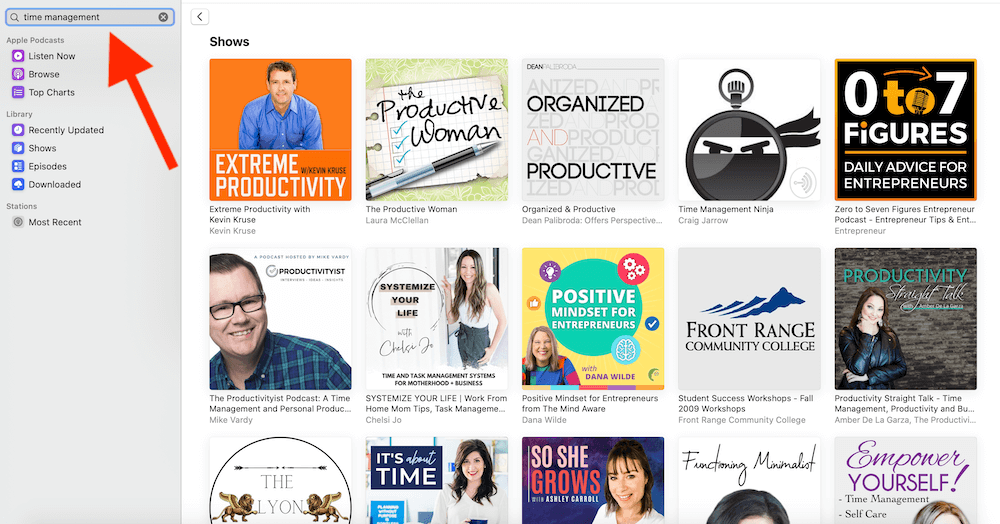
Dive into more details on how to be a guest on other podcasts to help grow your show.
2. Market to your existing audience
If you are adding podcasting as a way to market your existing business, or you already have people following your website and social media channels, then letting your existing audience know about your podcast is a no-brainer!
Your existing audience already knows, likes, and trusts you, and they’re going to be SO excited to hear that you have even more great value to share with them via audio!
This strategy can be very detailed, or it can be super simple. Anything from creating podcast trailers and teasers to share with your audience, to simply sending out an email recap of each of your episodes and encouraging them to tune in, can make a big difference.
Email marketing is nothing to forget about. While most are opting for messenger bots and text messages, I’m a firm believer that email is still an incredibly powerful way to reach your audience – through a platform you own.
3. Be active in social media groups
Being an active and valuable member in social media groups where your perfect listener is hanging out at is gold.
Again, this is a strategy that takes time, and you have to commit to being in at least 1 – 2 groups daily for this strategy to be effective. If you’re willing to do that, it can boost your growth quite quickly.
Search Facebook groups, LinkedIn groups, or wherever you believe your perfect listener hangs out the most.
Look for groups that are active and engaged that are focused on your topic or industry.
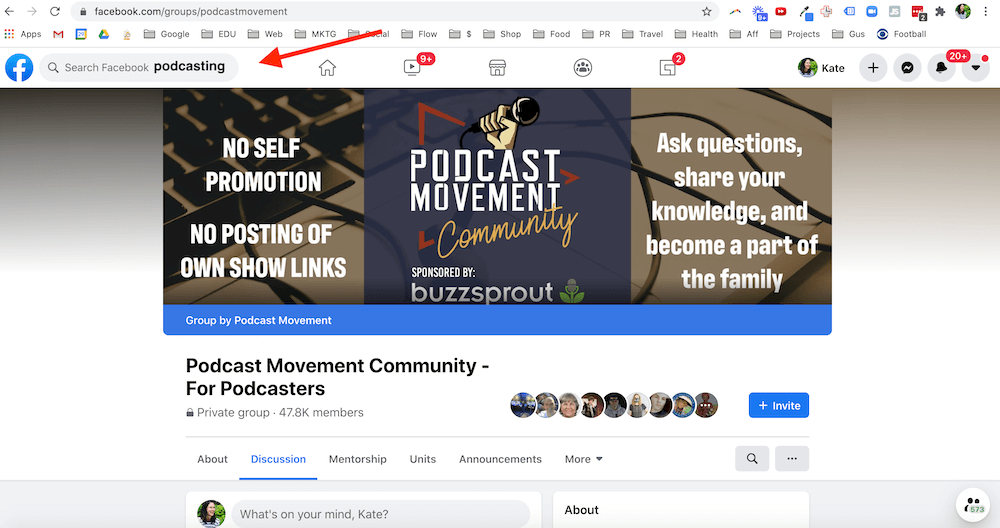
Request to join and be a valuable member of that group for at least 30 days.
Every day hop into the group and do the following:
- Answer a question
- Ask a question
- Provide 1 piece of guidance
- Provide 1 recommendation
At the end of 30 days, you’ll be amazed at the connections you’ll make and the genuine interest the members of that group have for what you do.
Once you’ve been an active and valuable member for 30 days, reach out to the group admin (if you haven’t already). See if they’d like to be a guest on your show!
If they say yes, you can ask if they’ll share it in the group once it goes live.
On an ongoing basis, as long as you’re not breaking any group guidelines or rules, continue to be a member of value AND when appropriate, share content and episodes you’ve recorded in response to others’ posts that are relevant.
4. Advertise on other podcasts or within a network
Being a guest on others’ podcast is a great way to broaden your reach in a very targeted way.
A less time-consuming approach that can net similar results is advertising your podcast on other podcasts or within a network that talks about the same topic as you.
Just the same way you search for podcasts to be a guest on, you would follow the exact same steps for this approach. The only difference is that instead of asking to be a guest on their podcast, you’re asking if there are any advertising opportunities available.
5. Content marketing
Podcasting is a marathon, not a sprint. Most people hear ‘content’ and think “nah – that’ll take too long”.
However, creating free, valuable, consistent content on topics we know our audience is looking for has been the most powerful long-term growth strategy for us. Period.
We do not run any paid advertising in our business. But we have spent years creating keyword rich, targeted content on our podcast website that we know people in our ideal audience are searching for.
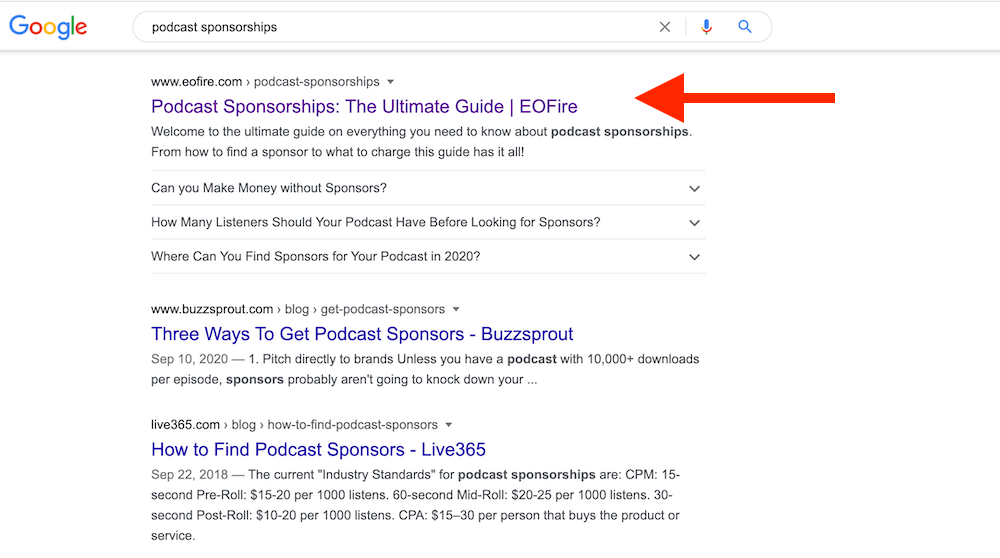
The SEO benefits, the organic traffic, and the know, like, and trust we’ve created with this strategy has not only resulted in growth, but it has also created a snowball of word-of-mouth benefits. When you turn a website visitor or first-time podcast listener into a raving fan, they’ll do your promoting for you!
It starts with a single blog podcast or show notes page. And it’s never too late to start.
How to Promote a Podcast
Now that you have an overall strategy for your podcast’s visibility and reach, let’s look at making sure your new episodes are being promoted on an ongoing basis for continued success.
There are 3 main components required to make sure you’re getting each new podcast episode out to your existing listeners – and hopefully in front of the right people who will become new listeners, too.
- Send to your existing email list
- Ask your guest to share with their audience
- Repurpose (on social media and other channels)
Let’s break each of these down in detail so you know how to execute.
1. Send to your existing email list
While this might sound like a time-consuming tasks, the great news is sending an email to your list to let them know you have a new episode out – and maybe some bullets or a short paragraph about why they should tune in – can be super simple.
First, create an email template with an intro, the body, and an outro.
Then, when you send an email to your existing list about the fact that you have a new episode out, you’re not starting over at square one. You already have an outline that you can just use to plug-and-play.
We send out 2 emails to our list every week to let them know about the podcast episodes that went live that week: the first email gives them a “look ahead”, and the second email is a “review”.
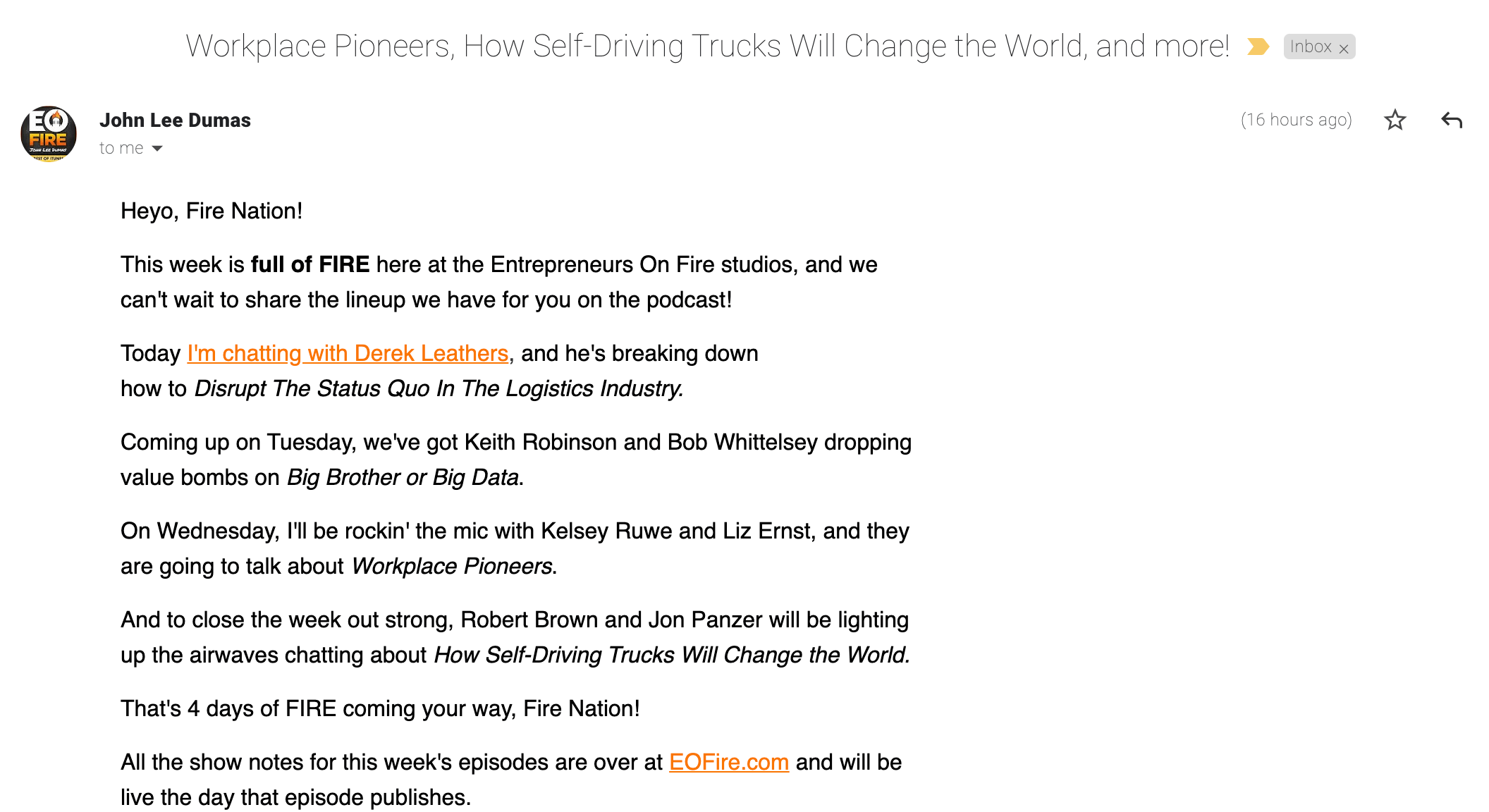
It not only allows us to promote our guests and sponsors, and shine the spotlight on them, it also gives us an opportunity to remind our audience that our podcast is alive and well!
2. Ask your podcast guests to share with their audience
If you do an interview-based show, don’t forget to reach out to your guest and ask if they’ll share with their audience!
Again, you can create email templates to make this a very simple process.
- Email your guest after the recording to thank them, and to let them know when the episode will go live.
- Email your guest the day before the episode goes live.
- Email your guest the day the episode goes live with links to their show notes page, links to the major directories, and some copy they can use to quickly and easily share on the social media channel of their choice.
Make it easy for your guests to share with their people, and chances are, they will!
3. Repurpose on social media and other channels
Repurposing your podcast content is powerful.
It allows you to reach your audience where they are, and it allows you to leverage your content without spending a ton of time having to create more.
Where you repurpose your content will depend on what platforms you’re active and engaged on – and where your audience is hanging out.
Some examples of where and how you might repurpose your podcast episodes include:
- Podcast audio > transcripts for your show notes page (Descript is a great tool for this)
- Audio > blog post
- Audio > show notes page > social media quotes
- Audio > transcripts > ebook (collecting a series of episodes and putting them together to create an ebook)
- Audio > YouTube (a great tool for this is Repurpose; our affiliate link is EOFire.com/repurpose)
- Audio > all social channels (a great tool for this is Splasheo; our affiliate link is EOFire.com/splasheo)
- Audio > opt in download (gather your top 10 favorite guests’ quotes and put them together in a download)
Repurpose Graphic for Facebook:
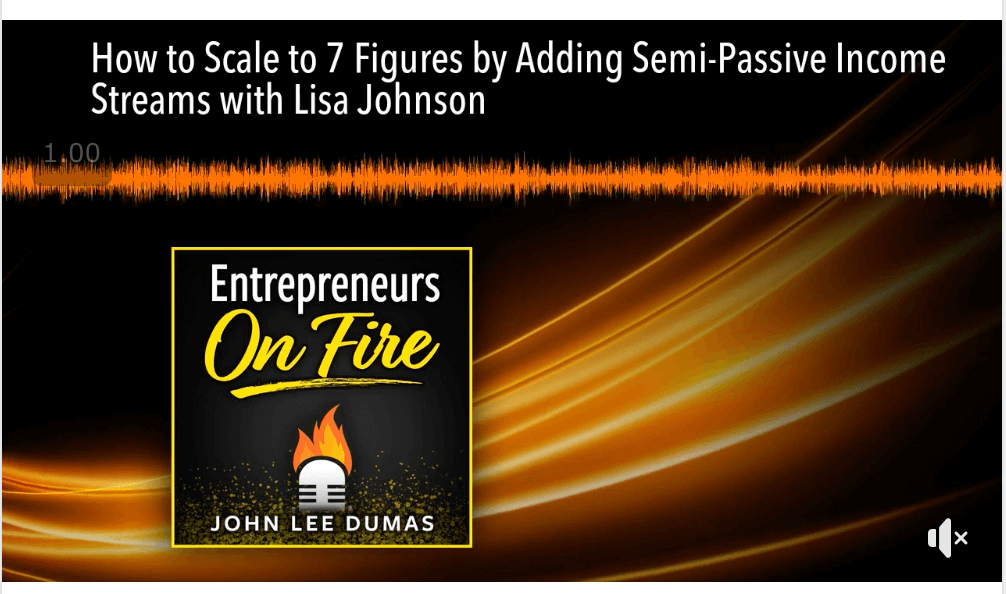
Splasheo Graphic for Instagram:
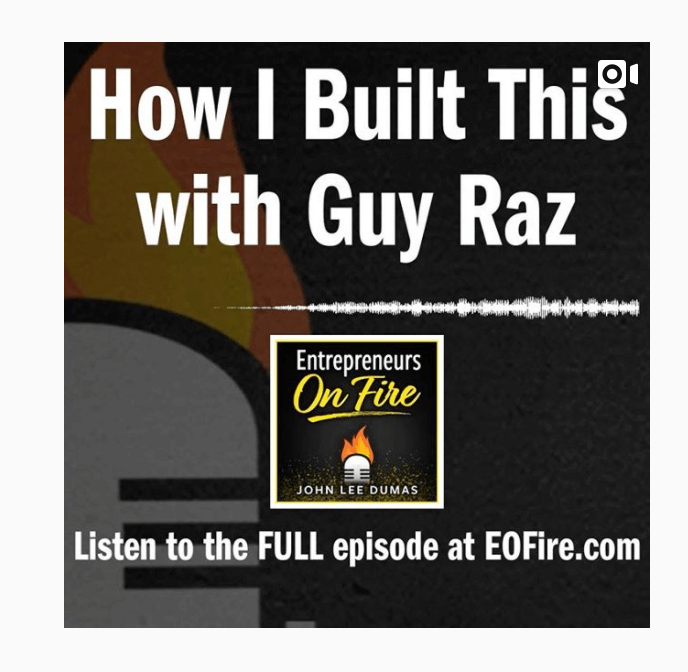 There are so many opportunities to create additional content from the time and effort you’ve already invested in creating your podcast episode. Don’t miss out on these opportunities, as they can have a big impact for your listeners!
There are so many opportunities to create additional content from the time and effort you’ve already invested in creating your podcast episode. Don’t miss out on these opportunities, as they can have a big impact for your listeners!
The Importance of Your Podcast Content and Moving Forward
People are looking for solutions to their biggest pain points and struggles.
If you can provide your listeners with solutions to their problems, then you will win.
Remember, growing your show and increasing the likelihood that more people will find out about your podcast isn’t an overnight thing. You have to commit to building a strong foundation, to knowing who your idea listener is, to niching down and being specific, and to being consistent.
Every time you put out a new episode, it should be intentional. It should contain an answer or a quick win or an idea or inspiration that your listeners will be excited to learn about – and grateful to hear.
When you turn your first time website visitors, and those who are tuning into your first episode, into raving fans, them helping you grow your show is inevitable.